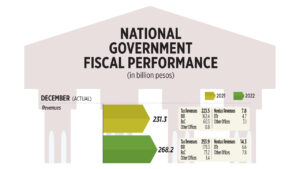Demographics is destiny: the Catholic Catechism

(Part 5)
It is not improbable that the human species will disappear if the very visible trends prevailing in some highly developed countries of distorting the very nature of marriage and of sexuality are not arrested or at least prevented from contaminating other societies that are still on the way to becoming fully developed economies such as the countries in the African continent or in South Asia.
It is in this context that I once again refer to the definition of the “common good” as found in the Philippine Constitution of 1987. I feel strongly about this because as one of the 50 members appointed by the late President Corazon Aquino to the Commission that drafted the Philippine Constitution, I was very directly involved in making sure that the common good is not defined as “the greatest good for the greatest number” but as “a social or juridical order that enables every single member of society to attain his or her full development economically, politically, culturally, socially, morally and spiritually.” With this definition, it becomes clear that integral human development goes much beyond economic or material progress. The spiritual dimension of man should be given as much, if not more importance.
This more comprehensive definition of the common good explains why there are declarations found in the Philippine Constitution about the duty of the State “to protect the unborn from the moment of conception” or “the family is the foundation of society and must be protected by the State” or “marriage is an inviolable institution.” Those of us in the Constitutional Commission responsible for the articles defining the very nature of marriage, of the family, and of the result of the marriage act were unapologetically influenced by the teachings of the Catholic faith about marriage, sexuality, and the family. I strongly believe that if there are enough citizens in a given society who live according to these teachings (including non-Catholics who accept the principles of natural law), then there is no danger of the human species disappearing. That is why I will summarize in this article what the Catechism of the Catholic Church teaches about marriage, sexuality, and the family.
In paragraph 1,603 of the Catechism, we read “The intimate community of life and love which constitute the married state has been established by the Creator and endowed by him with its own proper laws… God himself is the author of marriage. The vocation to marriage is written in the very nature of man and woman as they came from the hand of the Creator. Marriage is not a purely human institution despite the many variations it may have undergone through the centuries in different cultures, social structures and spiritual attitudes. These differences should not cause us to forget its common and permanent characteristics. Although the dignity of this institution is not transparent everywhere with the same clarity, some sense of the greatness of the matrimonial union exists in all cultures. ‘The well-being of the individual person and of both human and Christian society is closely bound up with the healthy state of conjugal and family life.” There is enough evidence in countries like the US in which moral aberrations like divorce, abortion, same-sex unions, and other practices contrary to these teachings end up in the moral disintegration of society.
The Catechism also clearly states that marriage is between a man and a woman. In some societies, there is a greater danger that the human species will disappear if same-sex unions become the general rule. In paragraph 1,605 of the Catechism, it is clearly stated that “man and woman were created for one another. It is not good that the man should be alone. The woman, ‘flesh of his flesh,’ his equal, his nearest in all things, is given to him by God as a ‘helpmate’: ‘Therefore a man leaves his father and his mother and cleaves to his wife, and they become one flesh. The Lord himself shows that this signifies an unbreakable union of their two lives by recalling what the plan of the Creator had been in the beginning.’ ‘So they are no longer two, but one flesh.’”
The teachings of the Catholic Church directly related to the use of sex in the marital union are found in paragraph 1,652 of the Catechism: “By its very nature the institution of marriage and married love is ordered to the procreation and education of the offspring and it is in them that it finds its crowning glory.” As regards having children, it is clearly stated that “Children are the supreme gift of marriage and contribute greatly to the good of the parents themselves. God himself said: ‘It is not good that man should be alone,’ and ‘from the beginning He made them male and female,’ wishing to associate them in a special way in his own creative work, God blessed man and woman with the words: ‘Be fruitful and multiply.’ Hence, true married love and the whole structure of family life which results from it, without diminishment of the other ends of marriage, are directed to disposing the spouses to cooperate valiantly with the love of the Creator and Savior, who through them will increase and enrich his family from day to day.”
Obviously, giving life to their children is not the only human and spiritual duty of the married couple. The Catechism clearly states that “the fruitfulness of conjugal love extends to the fruits of the moral, spiritual and supernatural life that parents hand on to their children by education. Parents are the principal and first educators of their children. In this sense the fundamental task of marriage and family is to be at the service of life.” It may happen, though, that God does not send children to a married couple. The Catechism has a word for these childless couples: “Spouses to whom God has not granted children can nevertheless have a conjugal life full of meaning, in both human and Christian terms. Their marriage can radiate a fruitfulness of charity, of hospitality and of sacrifice.”
These teachings may be difficult to put into practice, even by those who profess the Catholic faith. This is where the spiritual dimension of the common good comes in. The Church to which they belong provides them with abundant spiritual and supernatural help to do what is humanly difficult. We read in paragraph 1,655 of the Catechism: “Christ chose to be born and grow up in the bosom of the holy family of Joseph and Mary. The Church is nothing other than ‘the family of God.’ From the beginning, the core of the Church was often constituted by those who had become believers ‘together with those of their household.’ When they were converted, they desired that their whole household should also be saved. These families who became believers were islands of Christian life in an unbelieving world.”
It is not hubris to state that countries like the Philippines in which there are still a sufficient number of Catholics and people of other religions or no religion who practice in their lives these teachings on marriage, family, and sexuality are the ones who will prevent the human race from disappearing from the face of the earth.
Bernardo M. Villegas has a Ph.D. in Economics from Harvard, is professor emeritus at the University of Asia and the Pacific, and a visiting professor at the IESE Business School in Barcelona, Spain. He was a member of the 1986 Constitutional Commission.




